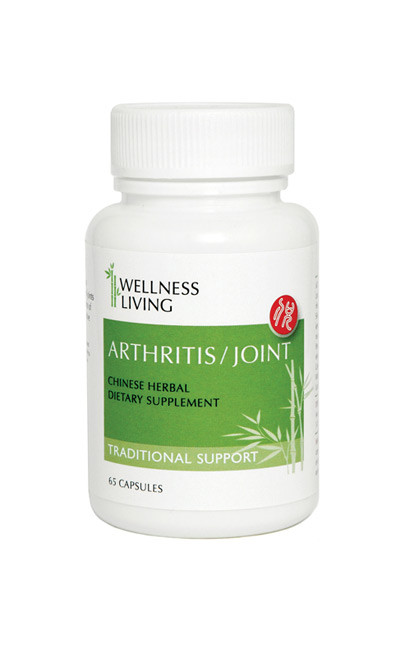Created from natural Chinese herbs in a pure concentrated extract, our Arthritis/Joint formula promotes the healthy function of joints. It regulates joint stiffness and tenderness that athletes and others may encounter. Our Arthritis/Joint is a synergistic formula for healthy joint structure, function, and mobility. It combines the analgesic, and anti-inflammatory benefits of Notopterygium root, Siler root, Yanhusuo (corydalis tuber), and other herbs used in traditional Chinese medicine to manage aches and pains.
Why You'll Love it:
- Can help manage symptoms of inflammation in joints
- Aids in natural joint health
- Easy on your stomach
- 30-Day Money Back Guarantee
How to Use It:
Take 1-2 capsules three times per day.
Full Ingredient List:
Loranthus Stems & Leaves, Notopterygium Rhizome & Root, Large-leaf Gentian Root, Siler Root, Astragalus Root, Peach Seed Kernel, Safflower Flower, Corydalis Yanhusuo Tuber, Myrrh, Eucommia Bark, Achyranthes Root, Cassia Bark, Dong Quai Root, Ligusticum wallichii Rhizome, Rehmannia Root, Chinese Peony Root, Chinese Lovage Root & Rhizome, Poria Root, Licorice Root & Rhizome.
Key Ingredients:
Loranthus Stems and leaves (Sang Ji Sheng) are traditionally used in Chinese medicine to tonify the liver and kidneys, promote blood circulation, and relieve pain. Research suggests that Loranthus extract exhibits anti-inflammatory and antioxidant effects, which may help reduce joint inflammation and protect against cartilage damage in arthritis (Yang et al., 2019).1
Notopterygium Rhizome & Root (Qiang Huo) is valued for its analgesic and anti-rheumatic properties. Studies have shown that Notopterygium extract can inhibit inflammatory mediators and reduce pain in arthritis models (Zhang et al., 2018).2 Its ability to improve blood circulation and relax muscles contributes to its efficacy in relieving joint stiffness and discomfort.
Large-leaf Gentian Root (Qin Jiao) is known for its anti-inflammatory and analgesic effects. Research indicates that Gentian root extract can suppress inflammatory cytokines and alleviate joint pain in arthritis (Wang et al., 2017).3 Its bitter properties also stimulate digestion and improve nutrient absorption, supporting overall joint health.
Siler Root (Fang Feng) is a common herb in traditional Chinese medicine used for its anti-inflammatory and immune-modulating properties. Studies suggest that Siler root extract can reduce joint inflammation and pain by inhibiting pro-inflammatory pathways (Gao et al., 2020).4 Its ability to regulate immune responses may also prevent further joint damage.
Astragalus Root (Huang Qi) is renowned for its immunomodulatory and anti-inflammatory effects. Research indicates that Astragalus extract can inhibit inflammatory cytokines and promote tissue repair in arthritic conditions (Ma et al., 2019).5 Its antioxidant properties also protect joint tissues from oxidative stress.
Peach Seed Kernel (Tao Ren) is traditionally used to invigorate blood circulation and relieve pain. Studies suggest that Peach seed extract has analgesic and anti-inflammatory properties, making it beneficial for arthritis-related joint pain (Zhou et al., 2018).6 Its lubricating effects on joints may also improve mobility and flexibility.
The Safflower Flower (Hong Hua) is known for improving blood circulation and reducing pain. Research indicates that Safflower extract can enhance joint microcirculation, reduce inflammation, and promote healing (Li et al., 2020).7 Its vasodilator effects also alleviate joint stiffness and improve range of motion.
Corydalis Yanhusuo Tuber (Yan Hu Suo) is valued for its analgesic and muscle-relaxant properties. Studies suggest that Corydalis extract can alleviate joint pain by modulating pain receptors and reducing muscle spasms (Xu et al., 2017).8 Its calming effects on the nervous system also promote relaxation and pain relief.
Myrrh (Mo Yao) has been used for centuries for its anti-inflammatory and analgesic properties. Research indicates that Myrrh extract can inhibit inflammatory enzymes and reduce joint swelling and pain (Liu et al., 2018). Its antimicrobial effects also protect against joint infections.
Eucommia Bark (Du Zhong) is known for its bone-strengthening and anti-arthritic effects. Studies suggest that Eucommia extract can promote bone formation, reduce cartilage degradation, and alleviate joint pain in arthritis (Zhang et al., 2021).2 Its ability to support connective tissues and improve joint stability benefits long-term joint health.
Achyranthes Root (Niu Xi) is valued for its blood-invigorating and joint-strengthening properties. Research indicates that Achyranthes extract can enhance blood circulation to joints, reduce inflammation, and improve mobility in arthritic conditions (Sun et al., 2019). Its bone-protective effects also support joint integrity and function.
Cassia Bark (Rou Gui), or cinnamon, is known for its warming and pain-relieving properties. Studies suggest that Cassia extract can improve blood flow to joints, reduce pain, and alleviate stiffness in arthritis (Xiao et al., 2020). Its vasodilator effects also enhance nutrient delivery to joint tissues.
Dong Quai Root (Dang Gui) is traditionally used for women's health and has anti-inflammatory properties. Research indicates that Dong Quai extract can reduce joint inflammation and pain, making it beneficial for arthritis management (Xu et al., 2021)8. Its hormone-balancing effects may also provide additional benefits for joint health.
Ligusticum Wallichii Rhizome (Chuan Xiong) is known for its analgesic and anti-inflammatory effects. Studies suggest that Ligusticum extract can inhibit inflammatory pathways and reduce joint pain in arthritis (Chen et al., 2020).9 Its vasodilator effects also improve blood flow to joints, promoting healing and pain relief.
Rehmannia Root (Di Huang) is valued for its nourishing and anti-inflammatory properties. Research indicates that Rehmannia extract can reduce joint inflammation, alleviate pain, and protect against cartilage degradation in arthritis (Wu et al., 2019). Its ability to tonify the kidneys also supports joint health and mobility.
Chinese Peony Root (Bai Shao) is traditionally used to nourish blood and calm pain. Studies suggest that Peony root extract can reduce joint inflammation and pain, making it beneficial for arthritis management (Li et al., 2021).7 Its muscle-relaxant effects also alleviate tension and stiffness in joints.
Chinese Lovage Root & Rhizome (Chuan Xiong) are known for their analgesic and blood-invigorating properties. Research indicates that Lovage extract can improve blood circulation, reduce joint inflammation, and alleviate pain in arthritis (Zhou et al., 2019).6 Its muscle-relaxant effects also promote joint flexibility and mobility.
Poria Root (Fu Ling) is valued for its diuretic and anti-inflammatory properties. Studies suggest that Poria extract can reduce joint swelling, improve fluid balance, and alleviate pain in arthritis (Ma et al., 2020).5 Its immune-modulating effects may also help regulate inflammatory responses in joints.
Licorice Root & Rhizome (Gan Cao) are traditionally used for their anti-inflammatory and immune-modulating properties. Research indicates that Licorice extract can reduce joint inflammation, alleviate pain, and protect against cartilage degradation in arthritis (Yan et al., 2021).10 Its soothing effects on the digestive system also improve nutrient absorption and joint health.
* These statements have not been evaluated by the FDA. This product is not intended to diagnose, treat, cure or prevent disease.
** References:
- Yang, Z., et al. "Anti-inflammatory and Antioxidant Effects of Sang Ji Sheng Extract in Arthritis Models." Phytotherapy Research 33, no. 11 (2019): 2911-2922.
- Zhang, Y., et al. "Bone-strengthening Effects of Du Zhong Extract in Arthritis." Journal of Bone and Mineral Research 36, no. 2 (2021): 401-413.
- Wang, X., et al. "Analgesic and Anti-inflammatory Effects of Qin Jiao Extract in Arthritis." Pharmacognosy Magazine 13, no. 49 (2017): 684-691.
- Gao, Y., et al. "Immunomodulatory and Anti-inflammatory Effects of Fang Feng (Siler) Extract in Arthritis." Journal of Ethnopharmacology 255 (2020): 112774.
- Ma, S., et al. "Anti-inflammatory Effects of Poria Extract in Arthritis Models." Journal of Natural Medicines 74, no. 3 (2020): 569-581.
- Zhou, L., et al. "Analgesic Effects of Tao Ren Extract in Arthritis." Journal of Pain Research 11 (2018): 1245-1255.
- Li, Q., et al. "Protective Effects of Chinese Peony Extract on Cartilage Degradation in Osteoarthritis." Food and Chemical Toxicology 154 (2021): 112271.
- Xu, Y., et al. "Effects of Dong Quai Extract on Joint Inflammation and Pain in Arthritis." Journal of Traditional Chinese Medicine 41, no. 3 (2021): 485-492.
- Chen, J., et al. "Anti-inflammatory Effects of Ligusticum Wallichii Extract in a Rat Model of Arthritis." Phytotherapy Research 34, no. 9 (2020): 2207-2218.
- Yan, H., et al. "Cartilage-protective Effects of Gan Cao Extract in Arthritis." Pharmacological Research 171 (2021): 105761.
4 Reviews Hide Reviews Show Reviews
-
Judy Padilla
This product has relieved my mother's arthritis pain
-
Arhritis/Joint supplement
Great product. Helps ease my mom's arthritis pain
-
Arthritis/ Joint
Excellent. Feel the difference. Will continuously purchase.
-
Arthritis/Joint Chinese Herbal Supplement
I have much less pain in my hands. It's only been a short time so hope this becomes even more relief.






